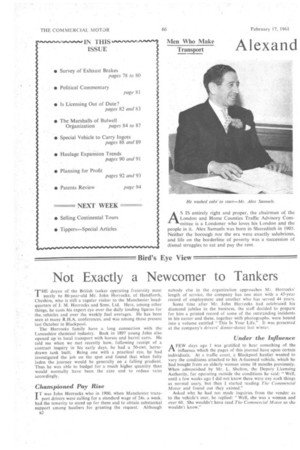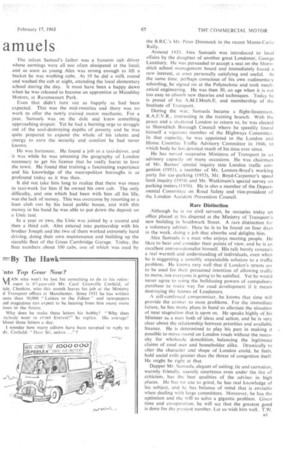Alexand amuels
Page 36

Page 37

If you've noticed an error in this article please click here to report it so we can fix it.
AS IS entirely right and proper, the chairman of the London and Home Counties Traffic Advisory Committee is a Londoner who loves his London and the people in it. Alex Samuels was born in Shoreditch in 1905. Neither the borough nor the era were exactly salubrious, and life on the borderline of poverty was a succession of dismal struggles to eat and pay the rent.
The infant Samuel's father was a hansom cab driver whose earnings were all too often dissipated at the local, and as soon as young Alex was strong enough to lift a bucket he was washing cabs. At 10 he did a milk round and washed the cab at night, attending the local elementary school during the day. It must have been a happy dawn when he was released to become an apprentice at Maudslay Motors, at Ravenscourt Park.
Even that didn't turn out as happily as had been expected. This was the mid-twenties and there was no work to offer the newly trained motor mechanic. For a year, Samuels was _ on the dole and knew something approaching despair. Yet he had a burning urge to struggle out of the soul-destroying depths of poverty and he was quite prepared to expend the whole of his talents and • energy to earn the security and comfort he had never known.
He was fortunate. He found a job as a taxi-driver, and it was while he was• amassing the geography of London necessary to get his licence that he really learnt to love the town. He found that training a fascinating experience and his knowledge of the metropolitan boroughs is as profound today as it was then.
It did not take him long to realize that there was more in taxi-work for him if he owned his own cab. The only difficulty, and one which had been with him all his life, was the lack of money. This was overcome by resorting to a loan club run by his local public house, and with this money in his hand he was able to put down the deposit on a Unic taxi.
In a year or two, the Unic was joined by a second and then a third cab. Alex entered into partnership with his brother Joseph and the two of them worked extremely hard driving, doing their own maintenance and building up the sizeable fleet of the Great Cambridge Garage. Today, the fleet numbers about 100 cabs, one of which was used by the B.B.C.'s Mr. Peter Dimmock in the recent Monte-Carlo Rally.
Around 1935. Alex Samuels was introduced to local affairs by the daughter of another great Londoner, George Lansbury. He was persuaded to accept a seat on the Shoreditch school management board and immediately found a new interest, at once personally satisfying and useful. At the same time, perhaps conscious of his own rudimentary schooling, he signed on at the Polytechnic and took mechanical engineering. He was then 30, an age when it is not too easy to absorb new theories and techniques. Today he is proud of his A.M.I.Mech.E. and membership of the Institute of Transport.
During the war. Samuels became a flight-lieutenant. R.A.F.V.R.„ instructing in the training branch. With the peace and a shattered London to return to, he was elected to Shoreditch Borough Council where he speedily found himself a vigorous member of the Highways Committee. In that capacity, he was appointed to the London and Home Counties Traffic Advisory Committee in 1946, to which body he has devoted much of his time ever since.
He has served successive Ministers of Transport in an advisory capacity on many occasions. He was chairman of Mr. Barnes' special inquiry into London traffic congestion (1951), a member of Mr. Lennox-Boyd's working party for car-parking (1953), Mr. Boyd-Carpenter's speed limit inquiry (1954) and Mr. Watkinson's special survey on parking meters (1956). He is also a member of the Departmental Committee on Road Safety and vice-president of the London Accident Prevention Council.
Rare Distinction Although he is no civil servant, he occupies today an office placed at his disposal at the Ministry of Transport's new building in Southwark Street. A rare distinction for a voluntary adviser. Here he is to be found on four days in the week, doing a job that absorbs and delights him.
Alex Samuels is a man who enjoys meeting people. Ile likes to hear and consider their points of view, and he is an excellent conversationalist himself. His talk barely conceals a real warmth and understanding of. individuals, even when he is suggesting a possibly unpalatable solution to a traffic problem. He knows very well that if London's streets artt to be used for their presumed intention of allowing traffic to move, not everyone is going to be satisfied. Yet he would never agree to using the bulldozing powers of compulsory purchase to make way for road development if it meant destroying the homes of Londoners.
A self-confessed compromiser, he knows that time will provide the answer to most problems. For the immediate future, he has many plans in hand to alleviate the situation of near stagnation that is upon us. He speaks highly of his Minister as a man both of ideas and action, and he is very clear about the relationship between priorities and available finance. He is determined to play his part in making it possible to move round on London roads without the necessity for wholesale demolition, balancing the legitimate claims of road user and householder alike. Drastically to alter the character and shape of London could, he feels, hold social evils greater than the threat of congestion itself. He might be right at that.
Dapper Mr, Samuels, elegant of suiting, tie and carnation, warmly friendly, suavely courteous even under the tire of criticism, has the best qualities of the adviser in high places. He has no axe to grind, he has real knowledge of his subject, and hic has balance of mind that is enviable when dealing with large committees. Moreover, he has the optimism and the will to solve a gigantic problem. Given time and co-operation, he will see that the greatest good is done for the greatest number. Let us wish him well. T.W.




















































































































